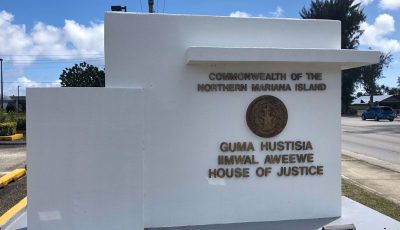ON REQUEST TO DECLARE 2016 BUDGET UNCONSTITUTIONAL
Chief justice orders Camacho to stop further proceedings
The CNMI Supreme Court has granted the government’s emergency motion to stop all proceedings in the Superior Court pertaining to a request to declare the 2016 Budget Act unconstitutional.
In an order issued on Friday, Chief Justice Alexandro C. Castro said all trial court proceedings in this matter are stayed pending the high court’s decision on the government’s petition to prohibit Superior Court Associate Judge Joseph N. Camacho from proceeding with the hearing on the motion to declare the 2016 Budget Act unconstitutional.
“We are convinced that the Commonwealth has raised a serious question on the merits, demonstrated the likelihood of irreparable injury, and shown the balance of hardship tips sharply in favor of the Commonwealth to justify staying the trial court proceedings,” Castro said.
Further, the chief justice said, they find that public interest is best served by granting a stay to preserve a level of legislative autonomy required by the Constitution.
“However, we conclude this without determining that the Commonwealth is more likely than not to prevail on the merits of the underlying claim,” he said.
Aside from filing the emergency motion to stay before the high court, the government also filed a motion to stay in the trial court.
Assistant attorney general David Lochabay asserted that Camacho should stay further proceedings pending the CNMI Supreme Court’s decision on the government’s petition to prohibit the judge from hearing on the budget issue.
Lochabay filed the motions after Camacho issued an order last Feb. 8 allowing the parties to call any witnesses at the evidentiary hearing who will be helpful in deciding the constitutionality of the 2016 Budget Act, including members of the Legislature.
Camacho set the evidentiary hearing for May 9, 2016.
Lochabay recently filed a petition, asking the CNMI Supreme Court to prohibit Camacho from proceeding with a hearing on the motion to declare the 2016 Budget Act unconstitutional.
Attorney Michael Dotts has argued that the Budget Act of 2016 is unconstitutionally unbalanced under the CNMI Constitution because it did not provide for the payment of judgments in a reasonable amount.
Dotts is counsel for plaintiffs Jotonia B. Aguon, Timothy Cruz, and Gorgonny Camacho.
Aguon and Cruz are holding a $35,000 judgment against the government in connection with their lawsuit over the death of their child at the Commonwealth Health Center.
Gorgonny Camacho is holding a $10,000 judgment against the government in connection with his medical malpractice lawsuit against CHC.
To collect payment of the two judgments that were entered in 2013, Dotts filed motions for orders in aid of judgment. He asked the Superior Court to declare the 2016 Budget Act unconstitutional. The two cases were consolidated.
In granting the government’s motion to stay, Castro determined that there are serious questions raised by the government to justify a stay.
Castro said the Commonwealth argues that the constitutionality of the 2016 Budget Act is irrelevant to an order in aid of judgment because the constitutionality of the budget does not affect the government’s ability to pay the plaintiffs.
This question, Castro said, in effect compels the high court to answer the issue of whether, in light of the high court’s ruling in the Marine Revitalization Corp. case, courts can enforce unpaid judgments against the Commonwealth by holding a budget act unconstitutional and whether post-judgments proceeding is a proper vehicle to accomplish that objective.
“If any of these questions are answered in the negative, we must then also inquire whether these proceedings may continue, and if so, whether the Commonwealth will be irreparably injured in the process,” Castro said.
The chief justice said the language of the trial court’s order violates the speech or debate clause because it permits examining members of the CNMI Legislature regarding the legislative process of the 2016 Budget Act.
Castro said while plaintiffs assert that the scope of discovery is limited, the broad parameters of examination permitted by the trial court’s order to call “any witnesses” from the House or Senate for the purpose of scrutinizing the 2016 Budget Act may lead to the disclosure of protected communications and actions of the legislators.
“Such order, taken at face value, impels legislators to account for their legislative acts before the judiciary—a procedure that infringes on the legislative privilege our Constitution safeguards,” he said.
Castro added that the potential harm is irreparable because once the depositions and evidentiary hearings are held, the protection is lost and cannot be remedied on appeal.



























